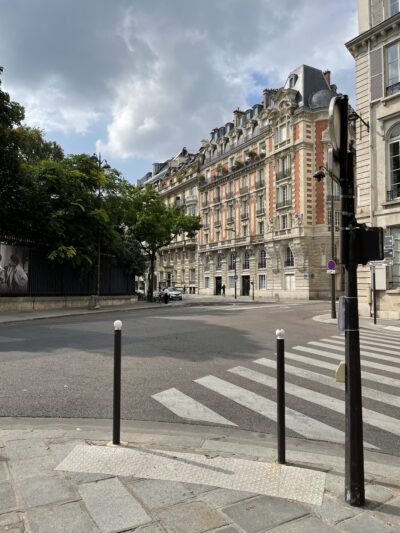
We’re asking students, recent grads, teachers, and counselors five questions on how languages play a role in shaping personal and professional success…
Meet Caitlin—a Tufts University graduate fromm Massachusetts holding a bachelor's degree in Biopsychology and Science & Technology in Society.
1. Could you share with us a little about your earliest experiences with languages at home and school? What’s the best part of growing up in a bilingual household?
I grew up in a bilingual household with a German mother and an American father. We always spoke both languages at home, and I attended a German international school until middle school.
I’d say the best part of growing up in a bilingual household lies in the cultural differences you experience. Being immersed in German language and culture from birth gave me an appreciation of and curiosity for all of the diverse languages and cultures outside of and within the U.S.
At times it felt isolating as well, as I struggled with feeling neither German nor American enough to fit into either category neatly. As an adult, though, I feel very grateful and fortunate to be able to communicate with people from different places and to have been instilled with this curiosity for other languages and cultures.
2. We’d love to hear more about your journey with French—including the exchange program you participated in during high school!

I started learning French in fifth grade. It was never really one of my favorite subjects, but also not my least favorite—just one that I had to do. High school is when I really began truly loving French. I was fortunate enough to have some really wonderful teachers, and I discovered how much I loved learning about French culture and literature.
My senior year, I participated in an exchange program in which I was paired with a host family that lived a little outside of Paris. I got to spend two weeks living with them and going to school with my host sister, following along in the typical life of a French teenager some days and taking sightseeing trips into Paris on others.
I loved everything about the trip, especially the experience of living with a host family. I felt like it gave me an insight into French culture in ways that you can’t necessarily experience as a tourist: what they eat for breakfast and dessert (often breakfast is something sweet and dessert is something savory!), how their toilets are often in separate rooms from the bathroom, and just the quiet patterns of their everyday life. For me, this is where the intricacies of cultural difference and similarity really come to life, and there’s something both fun and humbling about trying to adapt to these rhythms and see how they differ from your own.
3. As an undergraduate at Tufts University, you studied abroad in London. What was this like, and what impact did the experience have on your future plans?
I had the incredible opportunity to spend a semester abroad at Royal Holloway University, about 45 minutes outside of London, during my junior year of college. I chose to study history while I was there, which gave me some great background on British history and politics, and in turn informed some of my own discoveries I was making about the culture.
I got to live in a dorm with British students, buy my groceries at Tesco each week, and attend classes with British and other international students. On the weekends, my friends and I would go into London and explore. This was my first time being abroad alone, and I noticed that my confidence and independence grew immensely simply by knowing I could find my way in a foreign country. Unfortunately, the semester was cut short due to the start of the pandemic, so what was supposed to be a six-month stay turned into only two months. However, I’m incredibly grateful for the time that I got in the U.K., and for how it introduced me to my love for living abroad.
4. You’re currently working as an au pair in France. What does this involve, and what were some factors that led you to consider this role?
An au pair is essentially a nanny who comes from a different country to take care of a host family’s children for a year (or longer), thereby introducing an element of cultural exchange. You can do it in lots of different countries, but it’s particularly common in France.
I live with a host family in a suburb of Paris and take care of their children, which involves picking them up from school, bringing them to their after-school activities, cooking for them, etc.
The great part about au pairing (as opposed to being a regular nanny) is that the children and host family get exposure to a new language and culture through their au pair (lots of families seek out English-speaking au pairs for this reason), and the au pair gets the experience of living in another country and with a host family that can introduce them to the language and culture.
I knew that I wanted to spend some time abroad post-grad, especially since I had loved my semester abroad so much but had never gotten the chance to finish it. Au pairing seemed like a comparatively easy way to move and live abroad that had some built-in safety nets. You have a family that provides you with room and board and helps you navigate the tricky logistics of getting settled in a new country. I had also loved my experience of living with a host family in high school and felt like I could learn a lot by repeating that experience. And I was really interested in working with kids! You can definitely learn a lot from children, and I have really enjoyed getting a glimpse into what it’s like to grow up in France.
Au pairing also provides some built in social circles from the beginning. You have a host family as well as a vast network of other au pairs around the city and beyond. Paris in particular has so many au pairs that it was fairly easy to meet people. Through Facebook groups and meetups I was able to meet other people from the U.S. and around the world who, like me, were excited about spending a year or more in Paris and learning French.

5. Complete this thought: “Learning another language means…”
Learning another language means learning new ways to think and live.
In many ways, I feel as though I have discovered a new side of myself through learning French. Learning another language builds compassion, understanding, and respect for others, while providing a glimpse into another culture with its own ways of thinking. There’s so much to learn out there, and by stepping outside of our own native languages, we can connect with people who have both vastly different and uncannily similar experiences to our own. Appreciating and exploring these connections is, I think, both fascinating and incredibly important.
Check out our Connect with French and Language Programs & Funding pages to explore language scholarships, university programs, testimonials, and more! And, as always, visit @LangConnectsFdn on social media to share your story with us.
